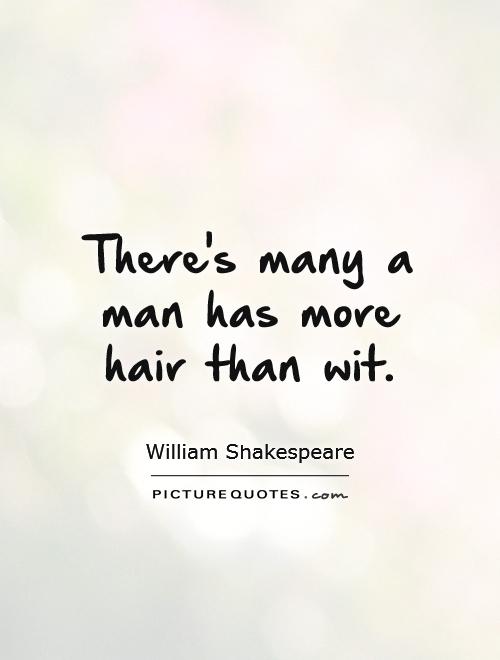There's many a man has more hair than wit

There's many a man has more hair than wit
In the world of William Shakespeare, wit and intelligence were highly valued qualities. Many of his characters, particularly in his comedies, rely on their quick wit and clever wordplay to navigate the complex social situations they find themselves in. However, Shakespeare also recognized that not everyone possessed this gift of wit, and that some individuals may rely on other qualities to get by in the world.The phrase "There's many a man has more hair than wit" speaks to the idea that outward appearances can be deceiving. In Shakespeare's time, a man's hair was often seen as a symbol of his virility and masculinity. However, having a full head of hair did not necessarily equate to having intelligence or wit. In fact, the phrase suggests that there are many men who may have a lot of hair, but lack the wit or intelligence to match.
This idea is reflected in many of Shakespeare's plays, where characters who may not be the most physically attractive or well-groomed often possess a sharp wit and keen intelligence. Characters like Falstaff in "Henry IV" or Touchstone in "As You Like It" may not be conventionally handsome, but they are able to outsmart their more physically attractive counterparts through their quick thinking and clever wordplay.
On the other hand, there are also characters in Shakespeare's plays who may be physically attractive, but lack the wit or intelligence to match. Characters like Claudio in "Much Ado About Nothing" or Demetrius in "A Midsummer Night's Dream" may be handsome, but they are easily manipulated and outwitted by those around them.
Overall, the phrase "There's many a man has more hair than wit" serves as a reminder that intelligence and wit are far more valuable qualities than outward appearances. In the world of William Shakespeare, it is often those who possess the gift of wit and intelligence who are able to navigate the complexities of the world and come out on top.












 Friendship Quotes
Friendship Quotes Love Quotes
Love Quotes Life Quotes
Life Quotes Funny Quotes
Funny Quotes Motivational Quotes
Motivational Quotes Inspirational Quotes
Inspirational Quotes